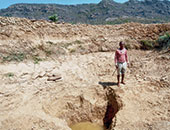 |
| Sugreev Rajvanshi at the pond in a small village in Bihar where he has found water. Picture by Deepak Kumar |
Gaya, April 10: Armed with an iron rod and a hammer, Sugreev Rajvanshi has compelled the mountains to yield water.
The 45-year-old farmer, who lives in Chandrashekhar Nagar — a small village on the border of Nalanda and Gaya districts in Bihar, around 150km south of Patna — has dug ponds through rocky terrain to fight the scarcity of water. The hamlet is in the lap of Chakra and Vanganga hills.
His inspirations: the desire to assuage the suffering of his fellow villagers, and Mountain Man Dashrath Manjhi.
Rajvanshi’s tryst with the labour of his love began in 2008, when scarce rain and deficient sources of water had brought life to the brink of despair in his village of around 1,000 residents, mostly Mahadalits.
Cattle were dying and the villagers had to trek 15km to reach the nearest hand pump.
So, one morning in December that year, the Class X passout woke up at the crack of dawn, took an iron rod and a hammer and set out for his one-acre plot.
As he was exiting his hut, his wife Sumeer Devi enquired: “Where are you going?”
Rajvanshi declared: “I’m going to dig a pond and get water out of this hilly land.”
Four years on, the result of his determination is evident in the two ponds — 15-foot deep, 50-foot wide and 40-foot long — he has dug. While water started to come out of one six months ago, the other is still dry.
Rajvanshi, who collects wood from the neighbouring forest and sells it to villagers for Rs 80-100 a day, is still digging the second one.
To meet him is not an easy task though.
One has to travel around 14km on a rocky road south from Vanganga town through a forest, whose inhabitants — neelgai, deer and porcupine — were uninhibited while crossing right in front of this correspondent’s car.
When The Telegraph reached the village, it was 2pm on April 7. To find Rajvanshi is not as difficult as the travel to the village: ask the first villager you come across and he or she will escort you to his humble residence.
Though he had somewhere to go, Rajvanshi was more than willing to take The Telegraph team to the ponds around five minutes walk away.
“The hills are nearly 200 feet high. Even hand pumps cannot extract water from the hard rocks,” he said.
His neighbours are already using the groundwater for cattle and to cultivate brinjals and chillies — two crops that require little moisture.
Asked about his inspiration, Rajvanshi said: “I had met Dashrath Manjhi when he was carving the mountain. His courage impressed me.”
From 1960 to 1982, Manjhi, a resident of Ghelaur village in Gaya, had cut a tunnel through the Ghelaur hills, reducing the distance between Atri and Wazirganj blocks from 75km to 1km. The Mountain Man had embarked on his epic project after his wife Falguni Devi died because of lack of treatment as the doctor was around 70km away.
Rajvanshi, the father of six, could now well earn the epithet “Water man”.
“While cutting the mountains, I broke three iron rods and two spades,” he said. “The villagers used to laugh at me. Some of them would even urinate on the fledgling cavities I had dug.”
He added: “When I first saw water, in November last year, I started to cry and hugged my family.” Those who had laughed at him have had to eat humble pie.
Villager Rambrij, 65, called Rajvanshi the “hero” of their village.
“When the drought of 2009 hit us, we thought we would have to abandon the land of our fathers and go away. But now, the problem has been solved to a large extent. We are sure that soon enough the two ponds would be full of water.”
Sumeer, Rajvanshi’s wife, is proud of his achievements. “I always knew that my husband would be successful. But the state government has not praised him and there has been no help from the administration.”
The only sign of administration in the village is the CRPF unit, which takes over the Naxalite-affected area after sundown.
But at 4am, a determined Rajvanshi sets out from his humble residence to continue from where he had stopped the previous day. He digs till 8am, usually on an empty stomach. Hunger does not daunt him though. After all, he has made himself responsible for quenching the thirst of his people.











